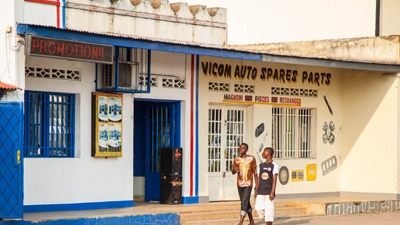BURUNDI, November 13, 2012 -- Louis Ntibuberwa is one of many Burundian entrepreneurs who are hopeful about Burundi’s path of business reform.
“I created my [second] company in a single day and in one place,” Ntibuberwa said. “Imagine that. And for me, this is a reason to hope.”
By making startup processes easier and faster for businessmen like Ntibuberwa, Burundi is being lauded as one of Doing Business 2013’s top improvers—no small feat for a country that emerged from civil war in just the last decade.
In 2010, Burundi asked for help to spur investment and create jobs. The World Bank Group answered the call by signing an agreement to support ongoing investment climate reforms through 2014.
The Burundi Investment Climate Program is aimed at spurring investment and job creation through reforms in areas such as protecting investors and starting a business, which now takes a maximum of eight days. Other reforms include lowering the time needed for, and costs of paying business taxes and obtaining construction permits, simplifying taxes for smaller businesses, and improving competitiveness in key sectors such as agribusiness and tourism. The reforms are also helping Burundi integrate more deeply into the East Africa Community, which it joined in 2007.
Laurent Corthay, World Bank Group private sector development specialist, leads the project. He said company registration was previously very onerous and complicated.
“When Burundi was at war, people became accustomed to working informally and avoiding registration,” Corthay explained. “So one goal is to make it easy to register companies and more attractive to comply with taxes. Formal status can increase access to finance and public procurement, which can be particularly important in a country that is reconstructing. Furthermore, formal companies usually have higher productivity and growth. Doing Business 2013 shows that Burundi’s commitment to improving the investment climate is strong.” Indeed, the country has been recognized as one of Doing Business’ Top 10 Most Improved Economies for the second year in a row.
The reforms have advanced sectors that are especially critical in a postwar economy. The Bank Group has helped speed up the construction permit process, which means that small business infrastructure can be built and rebuilt more efficiently. The country has also lowered costs for geotechnical studies which are needed for building permits. Burundi strengthened the regulatory framework for insolvency and restructuring, which is key in post-war contexts where many businesses have collapsed, as it helps free up capital that is locked in insolvent companies to be put to more productive uses.
Burundi has also taken steps to protect investors, which has boosted the confidence of Burundi’s business people. Reforms in this area include the institution of new requirements for approval of transactions between interested parties, mandating corporate disclosure to boards of directors and in annual reports, and making it easier for directors to be sued in the event of mismanagement. Burundi also made it substantially faster to trade at borders, in particular with Tanzania, speeding up the movement of goods from and to the port of Dar Es-Salaam. This is essential for the landlocked country.
Currently, World Bank Group teams are focusing their efforts on improving the newly established One-Stop-Shop for business registration and making compliance with the tax system easier, especially for very small businesses. These changes will mainly help smaller Burundian firms such as those in auto repair, mattress or bed part manufacturing, food processing, transportation, and construction.
Empowered Burundian entrepreneurs can help create a thriving economy and enhance social stability.
“Entrepreneurs create jobs,” Corthay said. “And jobs are the only sustainable way for people—including demobilized soldiers, youth and women—to improve their lives in the long run.”
Entrepreneur Juvénal Nininahazwe is equally optimistic about the future.
"I can’t believe it,” Nininahazwe said. “I made the request [this morning] and in less than 24 hours, I created my company with affordable fees. This should encourage others to do the same. This is a good opportunity that the country offers [entrepreneurs such as myself]. I hope this will last."
With Burundi entrepreneurs helping to rebuild the country one business at a time, the prospects for lasting peace and economic growth are certainly brighter.

